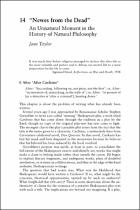| dc.description.abstract | This chapter is about the problem of writing what has already been
written.
Several years ago I was approached by Renaissance Scholar Stephen
Greenblatt to write a so-called “missing” Shakespeare play, a work titled
Cardenio that has come down through the tradition as a play by the
Bard, though no copy of the original play-text has ever come to light.
The strongest clue to the play’s possible plot arises from the fact that the
title is the name given to a character, Cardenio, a melancholy hero from
Cervantes’s celebrated novel, Don Quixote. In that novel, Cardenio has
lost his mind and lives disguised in the mountains because he believes
that his beloved has been seduced by the local overlord.
Greenblatt’s purpose was surely, at least in part, to consolidate the
full extent of the Shakespeare oeuvre and identify any works that might
make a claim to belong inside rather than outside the canon. He began
to explore literary fragments, and ambiguous works, plays of doubtful
attribution, or written as collaborations, and thus at the edge of the fixed
authentic Shakespearean writings. | en_US |

